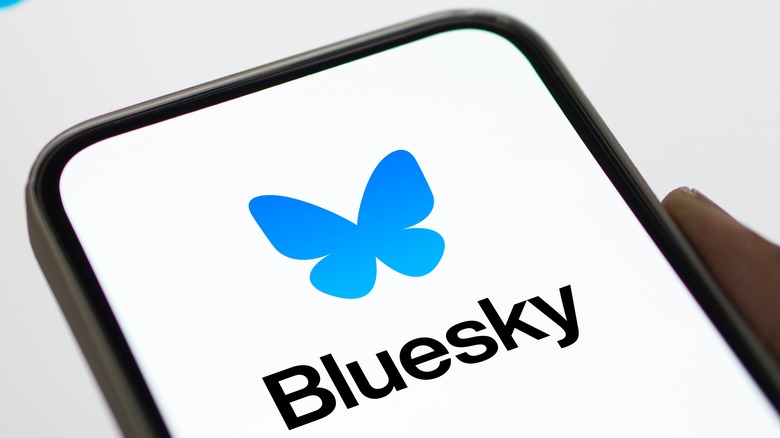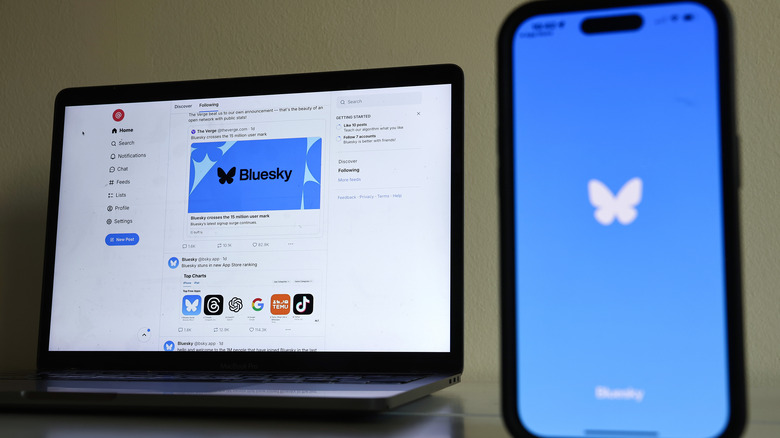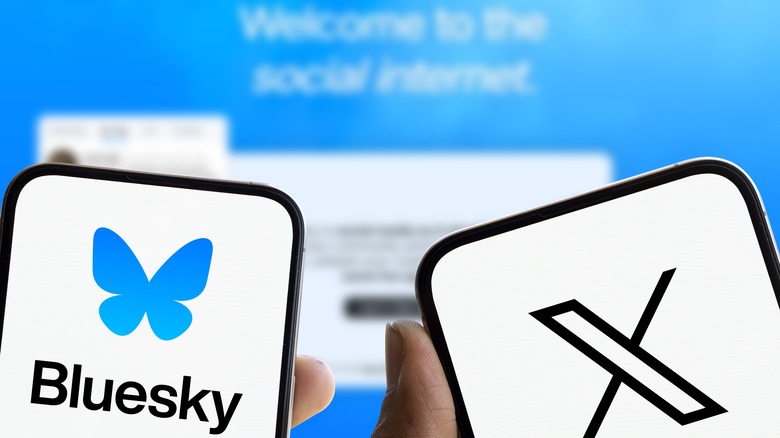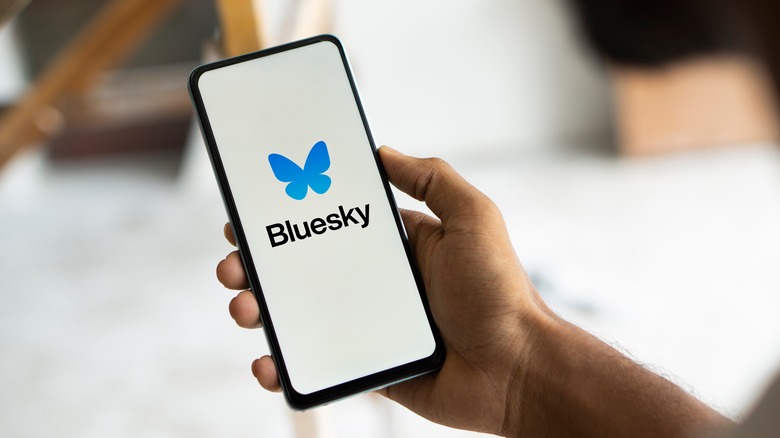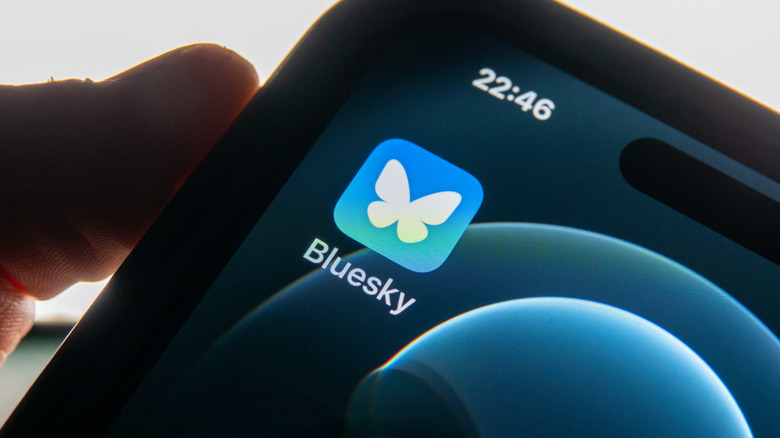Everything You Need To Know About Bluesky & How It Compares To X (Twitter)
If you've been following the currents of online culture, there's a good chance you've heard about Bluesky with increasing frequency. The microblogging site, which was founded by a former Twitter CEO, has been skyrocketing in popularity since the presidential election in 2024, in which Donald Trump won his second term in the White House. Some users of X (formerly known as Twitter), many of whom were already growing frustrated with the many changes made by its owner, Trump mega-donor Elon Musk, are finally jumping ship to Bluesky.
Aside from being less politically fraught, Bluesky is fundamentally different from X/Twitter in a few key ways. Its decentralized structure means users have more freedom with their data, and it has several features that make it easier to find the kind of content you're looking for — or avoid the content you're not. But can this brash new upstart really unseat X as the de-facto microblogging site? To find out, we took Bluesky through its paces and spoke to experts.
What is Bluesky and how did it start?
Bluesky was founded by former Twitter CEO Jack Dorsey, along with a number of people interested in decentralized technology — tech designed so that it isn't subject to the whims of a single company or its owner. The idea was that anyone could host their own instance of Bluesky, leaving the company responsible only for its own app and not for the platform as a whole. It may seem strange for the head of a company to work on a potential competitor, but Dorsey has a reputation as an iconoclast within Silicon Valley. In fact, further Twitter alumni got in on the ground floor of Bluesky, including Parag Agrawal, the CEO whose tenure stretched from Dorsey's exit to Elon Musk's arrival at the company. But when it came time to launch as its own company, Dorsey and Agrawal tapped Lantian "Jay" Graber, a promising young developer, as Bluesky's CEO.
The decision to keep Bluesky independent of Twitter proved prophetic. When Elon Musk took over the latter company in late 2022, he promptly nullified a prior agreement that would have seen Twitter folded into the decentralized web of platforms using Bluesky's technology and fired the people working to incorporate that tech. However, as Twitter changed under its new owner and was eventually rebranded as X, Bluesky continued to develop in the background. After a beta period during which sign-ups were available via invite only, Bluesky opened its doors to the general public in early 2024. Since then, it has grown slowly, but the platform began to explode in mid-November 2024.
How is Bluesky different from X/Twitter?
On the surface, Bluesky may look like just another Twitter clone, but under the hood, it's a very different platform. Just as on Twitter, you can post, repost, quote, and like posts. The difference is that Bluesky is decentralized, meaning anyone can host their own data and take their account with them to another instance of the platform. By default, a new user will appear as @username.bsky.social, but if you don't like that, you can use your own domain. For example, SlashGear could theoretically rehost an account on its own domain, giving it a username like @username.slashgear.com. (At the time of this writing, SlashGear does not have a Bluesky account.)
Another unique aspect of Bluesky is algorithmic choice. On Twitter, Threads, and many other social media sites, users are shown content based on a secretive algorithm closely guarded by the platform. On Twitter and Threads, you can choose between letting a proprietary algorithm decide what you see or sorting your timeline into pure chronological order. Bluesky, by contrast, lets you select between multiple open-source algorithms, giving users far more control over how their content gets sorted.
This algorithmic control manifests most clearly in the Feeds feature, which lets users create and subscribe to custom timelines based on particular topics, sets of users, or other criteria. When creating a Feed, you can choose which algorithm you want to rank the posts and even select how much weight the algorithm will give to the recency of any given post. This feature helped Bluesky to take on a life of its own, with a community-curated DIY culture that feels both fresh and distinct from other Twitter-like competitors.
Why is everyone joining Bluesky right now?
Buzz around Bluesky spread quickly through tech and media circles at its initial launch, hitting a million app installs last year. Now, it's taken on new life since the 2024 presidential election. With X owner Elon Musk having thrown his weight behind President-elect Donald Trump, many X users who don't align with Musk's politics now see the platform as politically hostile. That feeling was egged on by the explosion of hate speech that coincided with Musk's loosened moderation on the site, some of which Musk himself has engaged with. SlashGear reached out to journalist and Internet culture expert Taylor Lorenz, who says of X, "It's a very intense political environment on the app, and Elon has removed user controls that used to protect people." The result has been a mass exodus of users, which has been Bluesky's gain. At the time of this writing, Bluesky is the number one app on both the Apple App Store and Google Play Store, where it has remained for several days.
Bluesky is not the only alternative to X. Meta's Threads platform integrates seamlessly with Instagram and has already scored 175 million users as of July 2024. However, given that the point of leaving X was to escape from under the thumb of a tech billionaire, it's understandable that Threads, which is ultimately tied to Meta CEO Mark Zuckerberg, would prove nearly as unpalatable for a large portion of expatriated X users. "Threads ended up going crazy with the content moderation," Lorenz said, "and now I think people are realizing that Bluesky is the best alternative. Bluesky offers a very comparable experience to kind of the original Twitter."
Will Bluesky replace Twitter?
While Bluesky is benefitting from the X exodus, whether the current spike in growth can continue as a long-term trend remains to be seen. Lorenz suggested that, due to Elon Musk's entrenchment in the incoming Trump administration, X will remain an important part of the media landscape. "I think political people are so incredibly addicted to Twitter," Lorenz says. "And now with Trump in office, Twitter is going to remain a politically relevant platform that keeps journalists on there because they're going to want to see what Elon says."
Lorenz points out that X also remains the de facto platform for Congresspeople and other public figures. However, she's not willing to write Bluesky off in that regard just yet. "If lawmakers and pundits and journalists all do go to Bluesky, then I think it could replicate what Twitter had," Lorenz says.
Some public figures have already decamped to Bluesky from X, including journalists like New York Times columnist Jamelle Bouie and celebrities like "Star Wars" star Mark Hamill. According to award-winning author Charlie Jane Anders, who referred SlashGear to a public statement on the subject, her final straw was a reported proliferation of child sexual abuse material on X. "I feel the need to make a clean break from Twitter at this point," she wrote. "After all of the proliferation of hate speech, and the random shutdowns of progressive accounts that challenge the owner's rigid orthodoxy, I was already wanting to make a break for it. But after the latest scandals involving CSAM, I really feel as though I have no choice."
Whether or not Bluesky becomes the new Twitter, it's clearly promising what many people crave: a fresh start.
